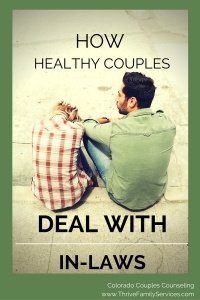Do you argue about the in-laws?
Our top tips for couples to keep the peace and stay strong together
If you find it hard to deal with in-law issues, just know – you are not alone!
Most couples struggle with in-law issues on some level. Having difficulties with your in-laws does not mean you’re in an unhealthy relationship.
It comes down to how you handle these challenges.
Here’s why you struggle with your in-laws
We want to know that we are the most important person to our partner. We want to know our relationship is solid, that our partner will always be there for us when we need them, and understand our feelings.
In-laws become challenging if we feel less important, that our partner doesn’t stick up for us, or if our feelings aren’t understood.
How do you prevent in-law difficulties from damaging your relationship?
An example: Your parents are a tad pushy
Of course you want to be a loyal spouse and son or daughter. However, in spite of your desire, you feel stuck in the middle of those different opinions and ways of doing things.
For example, “Rick’s” mom wants to have a family dinner every Sunday night and expects Rick, “Susan” and their kids to attend. Susan likes to relax on Sunday night to get ready for the work and the week ahead.
But, every time she brings this up, Rick says “You know how my mom is. She’s sensitive and will get her feelings hurt if we don’t go. We have to go”. So Susan ends up feeling pressured to go and believes Rick is standing up for his mother instead of taking her needs into consideration.
Susan’s hurt feelings and Rick’s lack of responsiveness eventually lead to conflict between them. Eventually, conflict could even arise between Susan and her in-laws.
If we had Rick and Susan in our Greenwood Village couples therapy office, we would work hard to help them communicate better about the in-laws. Susan most likely needs some time and space with Rick to express all of her feelings about the situation. Rick could likely use some support to be A.R.E. (Accessible, Responsive and Engaged) with Susan when she shares.
Only once they feel secure with each other by fully sharing their feelings are Susan and Rick likely to be able to talk about what they want to do with the in-laws.
Most people get that backwards. They try to discuss (argue) about what to do first. It’s a recipe for conflict between you and your partner!
How to Manage In-Law Conflicts in a Healthy Way
1. Healthy couples name and recognize their family history and patterns.
It is important to recognize and discuss your family history when beginning a relationship. Although most people may say that they do this- what may be missing is the most important:
How did your relationships growing up impact who you feel loyal or responsible to?
An example of this would be if “Marco” grew up with a very rocky relationship with his father and then grew incredibly close to his mother. Perhaps Marco protected his mom from his father’s criticism.
When his wife, “Juanita,” disagrees with his mother, it is very likely Marco would default to this pattern and defend his mother. Juanita gets angry and questions whose side Marco is on.
Marco and Juanita have an opportunity to calmly discuss Marco’s relationship to his mother. They can talk about the hurts he felt as a child as well as the love he feels for Juanita. Juanita can share how his choices feel for her.
Ideally, they come to a compromise about what role his mother plays in their lives and relationship. This is a loving conversation that allows them to grow closer, rather than getting stuck in the same hurtful argument about his mother.
It is important to recognize what each of you mean to one another as well as what your friends and family mean to you and your relationship.
2. Healthy couples understand that in-law relationships are not simple and they work hard at them
You most likely have negative patterns with each other and with your in-laws. Start first with your relationship. Explore together:
- What happens between us when we feel triggered by the in-laws?
- Figure out your biggest concerns with your parents or in-laws and then identify the feelings. Remember, your partner is NOT a mind reader, so you have to share those feelings!
- Do you feel excluded, judged, or not accepted by your in-laws? Or, are your feelings more about your partner and how they treat you when it comes to interactions with his/her parents?
- Do you feel scared, pressured, or trapped between your parents and your partner?
- Try to explore and share the underneath feelings, not just your anger or defensiveness.
- Then, share what you do with those feelings? Do you talk through it together, or do you get defensive, shut down, or take it out on your partner?
For example, you may feel your in-laws don’t think you are good enough for their child. Your in-laws may even regularly comment with their opinions on your wedding, marriage, finances, parenting, etc. Although their intentions may be good, this triggers your defenses!
Underneath, it hurts to not feel accepted, and it may even scare you that your in-laws can cause such problems in your marriage. What do you do with those feelings? Do you reach out to your partner and share your hurt and fears, or do you get critical or angry?
It is hard work to balance loyalties, set loving boundaries, recognize feelings and defense strategies and have loving conversations. But, if you can understand together your negative patterns surrounding your in-laws, you can build a strong relationship even if your in-laws are challenging.
3. Healthy couples set boundaries with their in-laws
After understanding each other’s feelings and the pattern that’s playing out in your relationship, you can figure out what boundaries you can set together to protect your relationship.
For example, if your mother-in-law always takes over the kitchen when she comes over for Thanksgiving dinner and it doesn’t feel good to you, you can agree to have a clear, loving conversation with her about it.
This may sound like “Mom, we appreciate you coming over and helping cook for thanksgiving but Kelly has a specific way she likes to prepare and cook. I’m wondering if next year you could bring a salad and mashed potatoes”.
This allows you to separate yourself and your spouse from your in-laws. You may still experience your mother-in-law as “intrusive” or “critical”, but you can feel secure that your relationship can handle those difficult moments because you talk about them. You can honor that your spouse’s relationship with their parent is important to them.
It is important to still have your needs met and take care of yourself, while also understanding and compromising for your partner, your relationship…and yes, your in-laws.
4. Healthy couples get help when conflict around the in-laws becomes problematic
Are you arguing about your or your partner’s parents? Do you try to talk about it, but end up arguing instead? Are there hurt feelings piling up, or even stand-offs happening on either side? If so, you may be caught in a negative cycle. It may be time to get help for your relationship before the hurts start to pile up.
Couples Counseling is our passion. We would love to help you sort through in-law difficulties in your relationship so you can have harmony in your family.
Contact us today at 303-513-8975 to see how we can help you resolve these dilemmas and renew the love, trust, connection you long to have. Or, schedule an appointment now using our online system. Schedule Appointment
Don’t miss our next blog post for great relationships!





